


- The Public Service Development Agency has issued a positive response on granting Georgian citizenship regarding 13,644 people and a negative one regarding 7,360 people to the Administration of the President of Georgia during 2018-2022.
- With the Presidential Decree, Georgian citizenship was granted to 13,575 persons; 5,111 out of them restored their citizenships, 8,382 citizenships were granted by way of an exception, 38 – under the regular procedure, 29 – under the simplified procedure, and 15 – under special procedure during 2018-2022.
- 72% of the 8,464 people who acquired Georgian citizenship during 2018-2022 (except the cases of citizenship restoration procedure) were Russian citizens.
- After Russian citizens, most of the Georgian citizenships were granted to the citizens of Ukraine (428 persons), Armenia (404), and the USA (330).
- In 2021, 1,342 Russian citizens acquired Georgian citizenship (except for the restoration cases), which exceeds the number from 2020 by 713 cases and the number from 2019 by 123 cases.
- In the first 7 months of 2022, Georgian citizenship was granted to 732 Russian citizens (except for the restoration procedure).
- After the Russian invasion in Ukraine, Georgian citizenship was granted through the procedure for exceptions to 551 Russian citizens and 8 Ukrainian citizens.
- The Public Service Development Agency does not disclose public information that is important for assessing the scale of increase in interest of Russian citizens to acquire Georgian citizenship in the context of the Russian invasion in Ukraine.
The grounds for acquiring Georgian citizenship for aliens is regulated by the organic law On Georgian Citizenship. According to the law, five forms of acquiring Georgian citizenship are defined:
- Regular procedure - Adults shall be granted Georgian citizenship under regular procedure if they have lawfully resided in Georgia for the last 10 consecutive years, they know the official language of Georgia within the established limits, they know the history of Georgia and the basic principles of law within the established limits, they have a job and/or real estate in Georgia, or carry out business in the territory of Georgia or hold an interest or shares in a Georgian enterprise.
- Simplified procedure - A person who is married to a Georgian citizen and who has continuously lawfully resided in Georgia for the last 5 years shall acquire Georgian citizenship under simplified procedure if he/she knows the official language of Georgia within the established limits, they know the history of Georgia and the basic principles of law within the established limits.
- By way of exception - The President of Georgia may grant Georgian citizenship by way of exception to a citizen of another country who has made a contribution of exceptional merit to Georgia or based on state interests. When evaluating state interests, inter alia, the following circumstances shall be taken into account: a foreign citizen considers Georgia to be his/her homeland, and he/she or his/her ancestor is a person residing in an occupied territory of Georgia or is internally displaced from the territory, or a person emigrated in different times due to political opinions or hard social and economic conditions; A foreign citizen has made/ is making such an investment in Georgia that contributes or has contributed substantially to the development of the state economy, and a foreign citizen is successful in sport, science, art, and is willing to carry on activity on behalf of Georgia.
- By way of Restoration - Georgian citizenship shall be granted by way of its restoration to persons whose citizenship has been terminated unlawfully, by renunciation of Georgian citizenship, as a result of the choice of his/her parents, or as a result of acquiring citizenship of another country.
- Special procedure - A person born in the territory of Georgia, whose Georgian citizenship cannot be established, shall have the right to acquire Georgian citizenship.
The Public Service Development Agency (PSDA) reviews applications of the persons interested in acquiring Georgian citizenship and forwards their opinion with regard to granting or refusing citizenship to the President of Georgia for the final decision.
On August 5, 2022, IDFI requested information about the statistics on granting Georgian citizenship (by forms of naturalization and citizenships of applicants) during the last 5 years from both Presidential Administration and the Agency (PSDA). The Agency did not disclose any of the requested information, hence the following analysis builds on the information from the Presidential Administration.
According to the information provided by the Administration, during the period of January 1st, 2018 – August 1st, 2022, the Agency forwarded 13,644 positive opinions with regards to granting of citizenship, following which the President of Georgia granted 13,568 persons Georgian citizenship, while 76 people were denied. Furthermore, the President of Georgia has initiated the process to grant citizenship to 7 persons.
Documentation provided by the Administration also revealed that the Agency forwarded negative opinions about granting citizenship on 7,360 people during the period of Jan 1st, 2018-Aug 1st, 2022. IDFI does not have detailed information about the reasons these applications were denied in the context of the applicants’ citizenships and dates of denial.
Among the 13,575 persons who were granted Georgian citizenship during the period of Jan 1st, 2018-Aug 1st, 2022, 5,111 were restored their previous citizenship. The majority of the remaining cases went through the procedure for exceptions (8,382 people). The regular procedure was used in 38 cases, the simplified procedure – in 29 cases, and the special procedure – in 15 cases.
Throughout the research period, 72% of the total 8,464 people who acquired Georgian citizenship (except restoration cases) were Russian citizens. The next most represented group were Ukrainians (428 persons), Armenians (404), and 33 citizens of the USA.
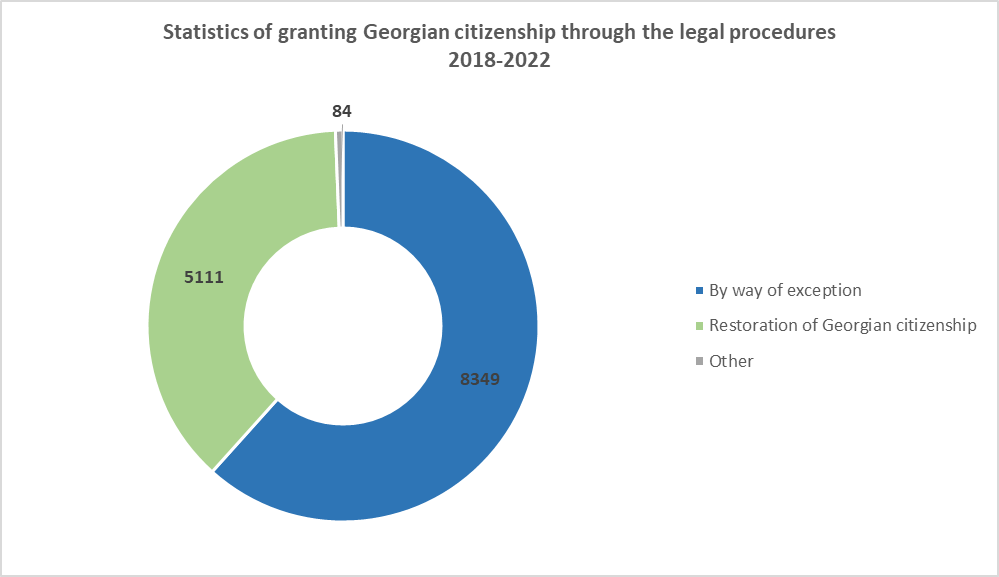
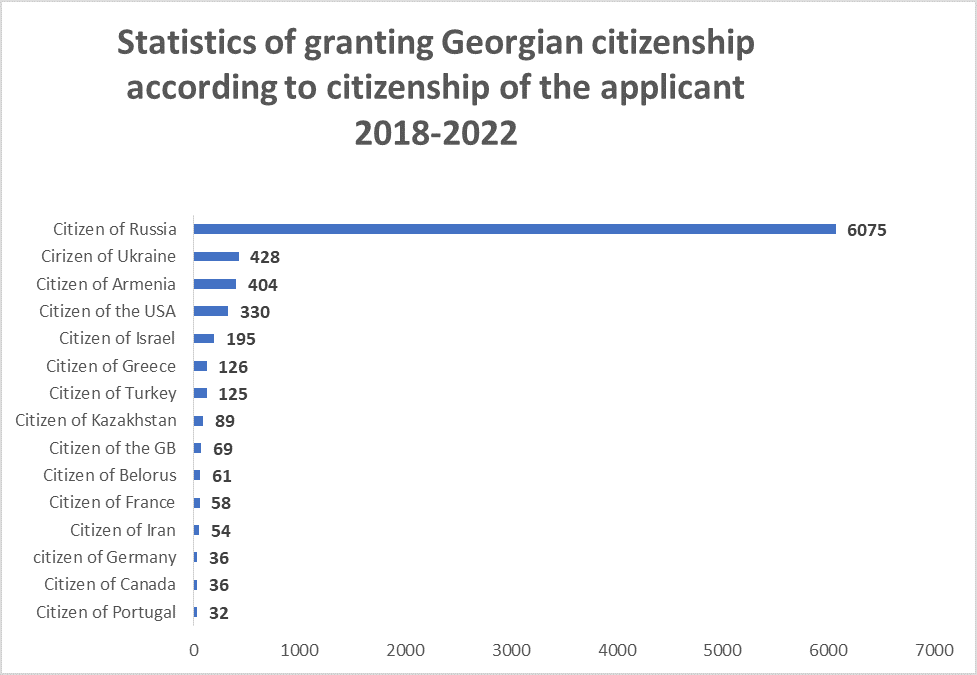
Note: The data of 2022 includes only the first 7 months of the year.
During the years 2018-2022, the highest number of citizenships were granted in 2018 – 3,858 cases. This number was approximately half in 2020 (1,839 cases), which might have been caused by the Covid-19 pandemic. The number of granted citizenships rose to 2,846 in 2021, and 1,598 people acquired Georgian citizenship in the first 7 months of 2022.
In most cases, granting Georgian citizenship was executed by way of exception until 2019, after which the numbers for the restoration procedure increase distinctly. The mentioned trend is connected to the legal amendments implemented in 2018. Specifically, the constitutional norm stipulating that dual citizenship shall be considered only in exceptional cases was annulled. Before the changes, a Georgian citizen acquiring citizenship of another country would automatically cause the forfeiture of the former and the person had to apply as an alien to acquire Georgian citizenship by way of exception. The limitations linked to dual citizenship were voided after the constitutional amendments, and a person can now request to keep the citizenship in the cases stipulated by law. Moreover, a norm was added to the organic law on Georgian Citizenship temporarily granting the right to restore Georgian citizenship. This right was available until December 31, 2020, and was extended until December 31.
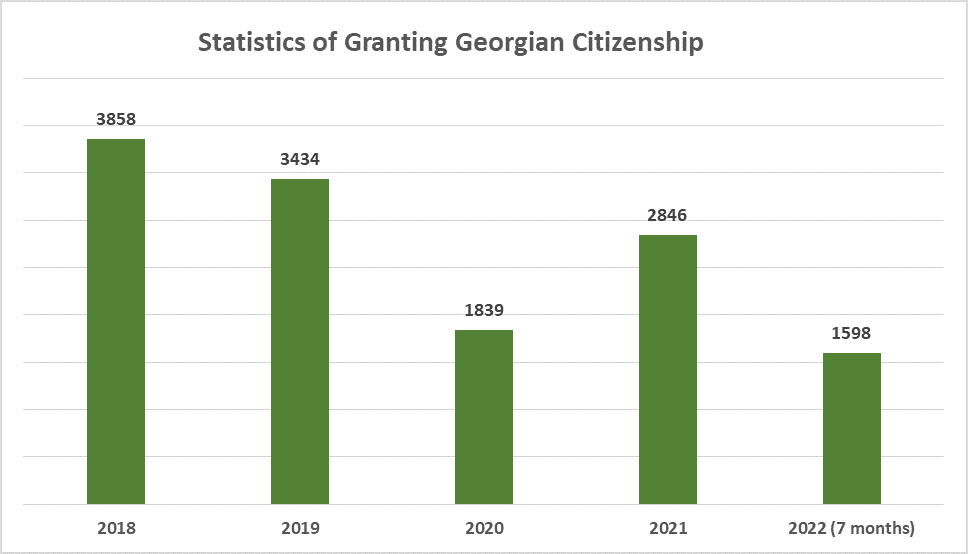
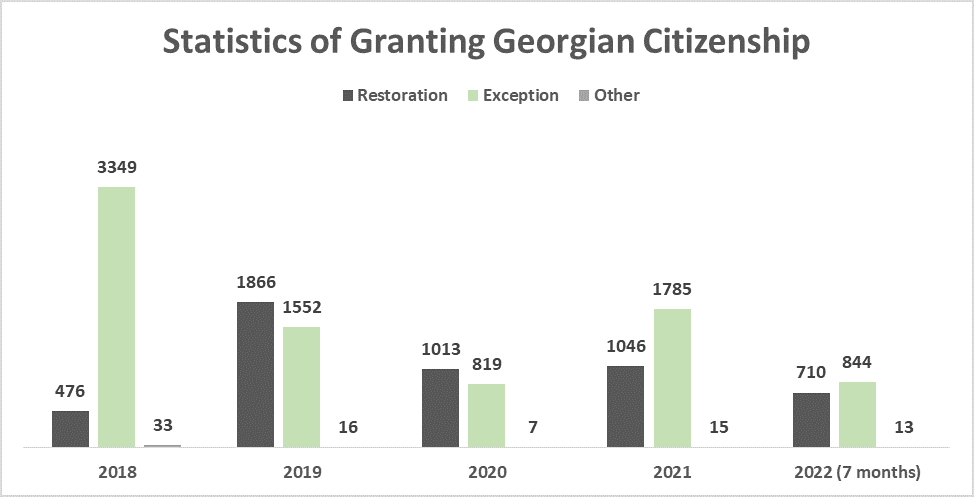
The data from 2018 provided by the Administration of the President of Georgia has a different context of legal regulations that later underwent changes, and therefore comparing it with the later data would not reflect accurate trends.
Russian citizens predominate significantly among the people acquiring Georgian citizenship during 2019-2022. 1,219 Russian citizens were granted Georgian citizenship (except for the restoration procedure) in 2019. This number fell to 629 in 2020, and rose again to 1,342 in 2021. As of the first 7 months of 2022, Georgian citizenship was granted to 723 citizens of Russia.
Considering the important developments after the Russian invasion of Ukraine in 2022, it is further interesting to analyze the indicators of 2022 by month. 74 Russian citizens were granted Georgian citizenship in January 2022, and 98 – in February. This number decreased to 43 in March, but increased sharply in the following months. For example, 162 persons received Georgian citizenship in June, and 136 - in July. After the Russian invasion of Ukraine, 551 Russian and only 8 Ukrainian citizens acquired Georgian citizenship by way of exception.
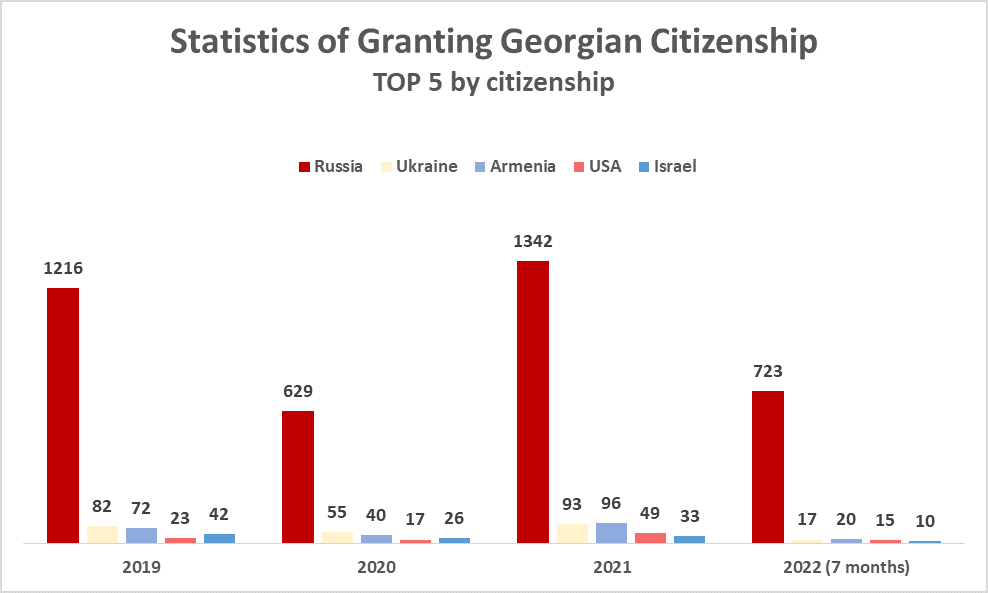
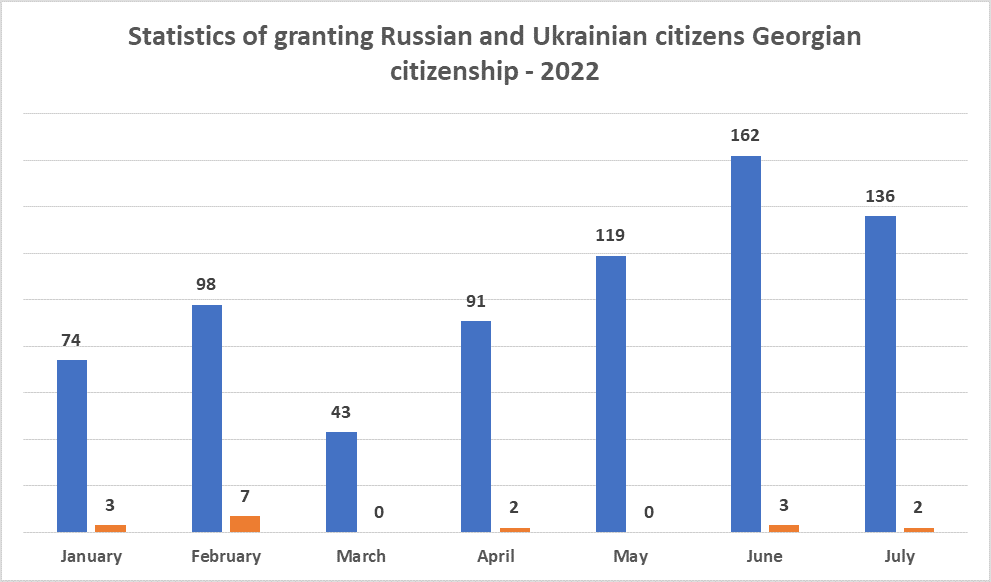
The analysis of the statistical data on granting of Georgian citizenship shows that, over the last 5 years, Georgian citizenship has been mostly granted to Russian citizens. Their interest in obtaining Georgian citizenship is expected to increase even more, taking into account the situation created after Russia's invasion of Ukraine on February 24, 2022 (expected long-term sanctions, etc.).
It is impossible to assess the impact of the Russia-Ukrainian war on the increase in the interest of Russian citizens in obtaining Georgian citizenship based only on the data of Georgian citizenship granted to them in the short term. In this regard, for an accurate evaluation, it is important to have complete data, which is related to the attempts to meet certain conditions for acquiring Georgian citizenship. For example, residence permits issued to live in Georgia, statistics of marriages with Georgian citizens, etc. Unfortunately, the Agency did not respond to the request for information about such data. IDFI has applied the relevant legal mechanisms against the Agency in order to obtain the mentioned information.
____

This material has been financed by the Swedish International Development Cooperation Agency, Sida. Responsibility for the content rests entirely with the creator. Sida does not necessarily share the expressed views and interpretations.